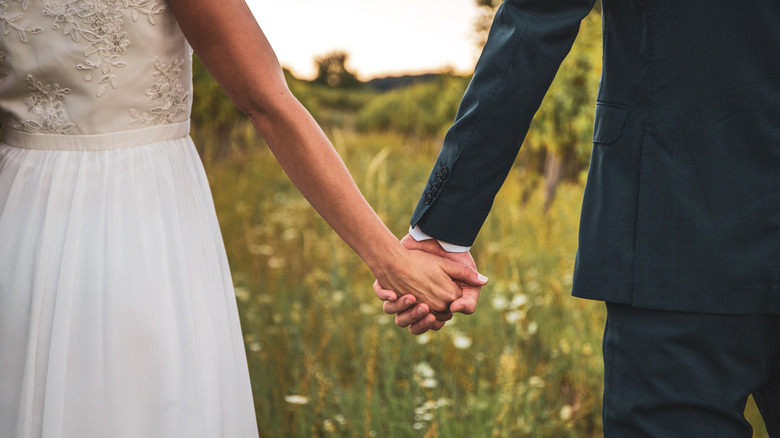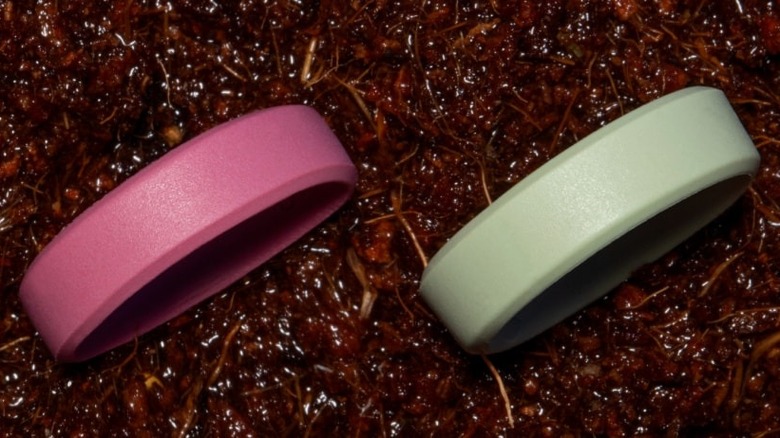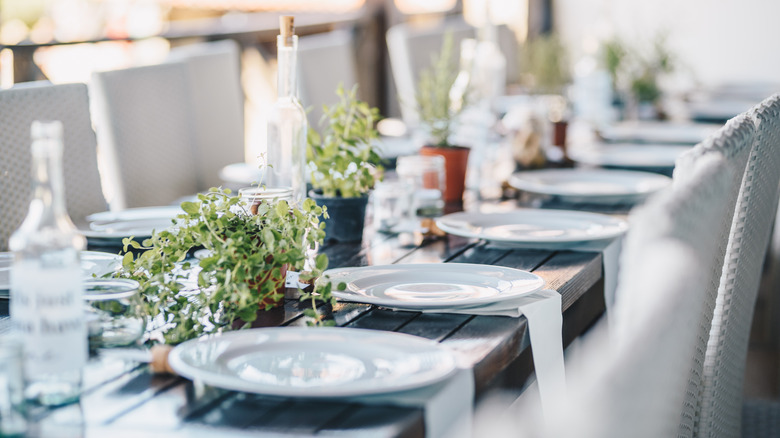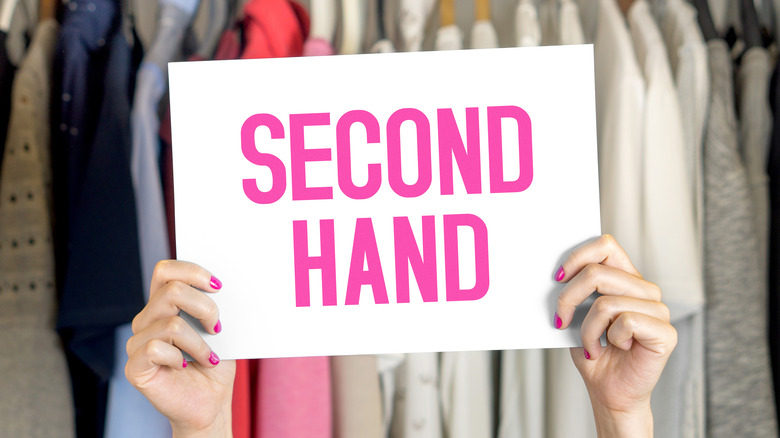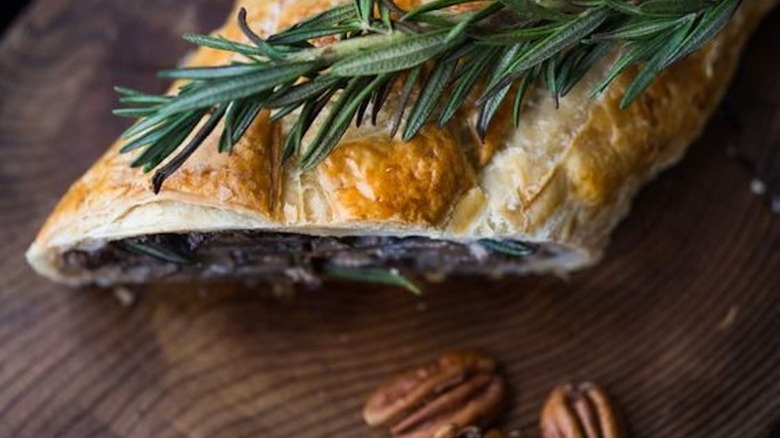6 Ways To Have An Eco-Friendly Wedding
Congratulations! You and your beloved have decided to say "I do" while treading lightly on Mother Earth. What a wonderful way to celebrate your commitment to each other and the environment. Considering the ecological footprint of your nuptials is the first step in creating a sustainable life with your partner.
In the United States, the average wedding will produce an astonishing 400 pounds of trash and emit over 60 tons of carbon dioxide, a potent greenhouse gas (via Zero Waste). Americans already produce three times the amount of garbage compared to the global average (via Verisk Maplecroft), which means the choices you make on your special day really do make a difference.
Thankfully, there are simple, affordable ways to throw a wedding without adding trash to landfills, polluting the air, or stripping the land. Even better, your commitment to a low-impact life together may inspire your guests to live more sustainably — a wedding favor that keeps on giving.
Narrow down the guest list
The first step to reducing all this wedding waste? Invite fewer people. The bigger your guest list, the bigger the carbon footprint of your event. From travel (sometimes across the world) to food, a smaller wedding means less trash and fewer emissions. Especially for guests flying in from out of town, you might consider purchasing carbon offsets — small sums of money paid as an investment in renewable energy to counteract the emissions of the flight (via National Geographic).
Or, if thanks to the COVID-19 pandemic, you've fully embraced your introverted self, hosting a virtual wedding could drastically reduce the footprint of your nuptials. A virtual wedding doesn't have to feel cold or distant: If you create interactive experiences — for example, an audio guestbook — for your attendees, they can engage in your event, even through their screens (via The Knot). That way, everyone can enjoy themselves together without ever boarding a plane — a truly eco-friendly feat.
Skip the paper invites
Paper invitations — like so many wedding traditions — have a long, rich history in American culture, dating back to the 19th century (via The American Wedding). However, in recent years, the world of digital invitations has exploded (via Refinery29). Paperless invites cost less, use fewer resources, and are by far, the most sustainable choice.
But because of their keystone place in the wedding-industrial complex, digital invitations may be perceived by your older guests as flippant, ill-planned, and disorganized. Still, if your intention to celebrate your wedding by conserving natural resources comes from a genuine place, then cutting out the cardstock is a great place to start.
Paperless wedding invitations are also easier and more convenient for both your and your guests. You can use them for tracking RSVPs, updating details, or announcing any last-minute changes — all for little or no cost (via Greenvelope). Guests can access this information wherever they are without having to keep track of a paper invite and any subsequent hard copy correspondence. While Boomer grandparents may lament the loss of the linen, you'll feel even better announcing your love with as small an impact as possible.
Reimagine your rings
Another small but powerful way to fight climate change is to reconsider the traditional wedding rings that symbolize your love. Two of the most popular materials in wedding bands, gold and diamonds, both present sustainability concerns. According to a 2012 open letter in the journal Environmental Research, gold mining contributes to deforestation with both large and small scale mining operations in West Africa and the Amazon continuing to grow in popularity. Likewise, the International Gem Society reports that 160 kg of greenhouse gasses are released for every carat of mined diamonds. Clearly, neither of these materials support your Earth-loving intentions.
Instead, consider one of the many green alternatives including vintage wedding bands (bonus points if your rings are family heirlooms), lab-grown diamonds, or ethically-sourced metals (via Weddings to the Wire and Christian Science Monitor). You may also take a less traditional route and select a sustainable material like wood or even a plant-based plastic like Qalo x Pela – the world's first compostable wedding ring. Other popular low-impact alternatives include jewelers that use recycled gold and silver, several of whom also plant a tree for every ring sold (via Sustainable Jungle).
Choose reusables
In the world of sustainable weddings, less is generally more. Forego disposable single-use paper and plastic that ends up crowding landfills by giving your guests reusable cloth napkins and tablecloths alongside washable glass and flatware (via Zero Waste). You could also choose compostable goods like plates and bowls made from sustainable sources like palm leaves (via Chic Leaf).
Luxuriate in all the pomp and circumstance of a traditional wedding using more alternative materials. Instead of decorating your venue with fresh-cut flowers that are often shipped across the world while perched atop non-recyclable plastic foam, opt for fabric flowers or potted plants, which also make great wedding favors for your guests. Want an ultra-fancy veil? Why not rent one? As bride-to-be Kate Winick told the Associated Press, "I don't think living sustainably means you need a crunchy aesthetic... It just means using what is already in the world. The most sustainable purchase is something that already exists" (via Christian Science Monitor).
Shop secondhand
During the COVID-19 pandemic, an interest in secondhand and thrift store shopping began to skyrocket across the country, so much so that today traditional retailers lag behind the growing resale market (via CNBC). And believe it or not, this holds even for the most revered of all wedding items — the bridal dress. This year, online reseller Poshmark noted that requests for used wedding dresses costing over $500 were more popular than ever (via Christian Science Monitor).
Sustainability is more than saying yes to the (slightly worn) dress. Extend this eco-friendly challenge to all your guests to prevent your loved ones from buying new clothes just for your wedding. That's what Lena Kazer and her future husband decided to do. "We told everyone they could wear whatever they wanted," she told the Associated Press (via Christian Science Monitor).
Kazer didn't stop there. "We're buying almost all decorations at thrift stores," she said. If hunting for goodies in a store doesn't speak to you, you could also scour online wedding resellers like Wedzee and BravoBride which offer a spectrum of wedding items ranging from napkins to bowties to gowns (via Zero Waste Wisdom). If you need a rule of thumb, follow fiancé Kate Winick's advice: If you only plan on using an item once before tossing it out, either purchase it secondhand or pass on it altogether (via Christian Science Monitor).
Consider your food options
Food plays a big role in our collective carbon footprints — over 30% of all human-created greenhouse gas emissions come from producing, processing, and packaging it, according to Carbon Brief. One of the quickest and easiest ways to reduce the water and carbon footprint is to feed your wedding guests less meat (via Chic Leaf). The biggest beef is with beef itself. Cows belch methane — a greenhouse gas around 30 times more powerful than carbon (via Newsweek), and the greater demand for beef, the more land is cleared to raise cattle, causing deforestation (via Scientific American).
Avoid those expenditures by hosting a plant-based feast. Your guests can dine on mushroom Wellington or balsamic roasted Brussels sprouts (via Weddingomania). Vegan eating is, after all, good eating — with a substantially smaller footprint.
As with any party, those lower-impact leftovers can be taken home or donated (via Zero Waste). Any waste generated on the day of the wedding can also be composted. Just confirm with your location that your wedding waste will become food for more food. At the end of your eco-friendly wedding planning, everything down to the last bit of trash will all become a part of one big, sustainable circle. If that's not true love, what is?
